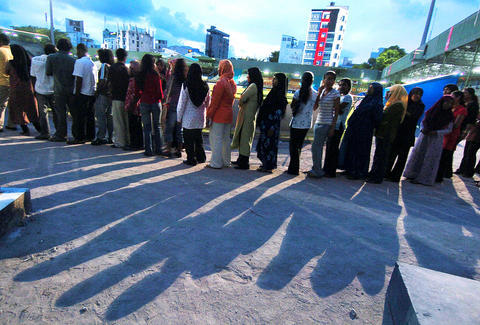Maldivian President Maumoon Abdul Gayoom appeared headed for an overwhelming victory yesterday in a referendum on the Maldives' future form of government, a poll seen as an informal vote of confidence on his three-decade rule of this tiny Indian Ocean nation.
Gayoom, criticized as a dictator by the opposition, supported a US-style political system with a powerful executive presidency for this Sunni Muslim nation of 300,000 people.
The opposition, wary of consolidating power in yet another leader, backed a British-style parliament, which would be led by a weaker prime minister.

PHOTO: AFP
The vote was seen as the first true expression of democracy in the Maldives' 43-year history.
Preliminary results yesterday morning showed the presidential form of government gaining roughly two-thirds support, 52,969 votes, to 26,544 votes for a parliamentary system.
Turnout had not yet been announced, so it was not clear what percentage of the referendum vote that represented, though it appeared to be well above half.
"If ever anybody needed, locally or internationally, an endorsement of how popular this man is, this is sufficient," presidential spokesman Mohamed Shareef said.
A credible poll was expected to clear the way for the Maldives to adopt a new constitution in November and to hold its first multiparty elections next year.
On Saturday, the main opposition Maldivian Democratic Party said it filed 120 complaints about voting irregularities.
The ruling party, known locally as the DRP, complained the opposition engaged in intimidation, violence and illegal campaigning, but as the favorable numbers began flowing in, they issued a release saying the vote was relatively peaceful.
"The people have definitely embraced the democratic reform agenda of the president," Shareef said.
MDP officials were not immediately available for comment on the results.
Calm prevailed on Saturday at many polling booths in Male and international observers on remote islands reported orderly voting.
Mohamed Shahuneem, 18, said he was going to vote for a presidential system to show his support for Gayoom.
"We are very happy. It's normal here because of the president," he said.
"If this man brings freedom and democracy to us, it will be a miracle," said Adam Maniku, 60, a former deputy finance minister.
Gayoom has led the nation of 1,190 coral islands through explosive economic growth, fueled by 600,000 tourists a year.
But Western diplomats and international human rights groups have accused him of using torture and police crackdowns to stifle dissent during his nearly three-decade rule.

With much pomp and circumstance, Cairo is today to inaugurate the long-awaited Grand Egyptian Museum (GEM), widely presented as the crowning jewel on authorities’ efforts to overhaul the country’s vital tourism industry. With a panoramic view of the Giza pyramids plateau, the museum houses thousands of artifacts spanning more than 5,000 years of Egyptian antiquity at a whopping cost of more than US$1 billion. More than two decades in the making, the ultra-modern museum anticipates 5 million visitors annually, with never-before-seen relics on display. In the run-up to the grand opening, Egyptian media and official statements have hailed the “historic moment,” describing the

‘CHILD PORNOGRAPHY’: The doll on Shein’s Web site measure about 80cm in height, and it was holding a teddy bear in a photo published by a daily newspaper France’s anti-fraud unit on Saturday said it had reported Asian e-commerce giant Shein (希音) for selling what it described as “sex dolls with a childlike appearance.” The French Directorate General for Competition, Consumer Affairs and Fraud Control (DGCCRF) said in a statement that the “description and categorization” of the items on Shein’s Web site “make it difficult to doubt the child pornography nature of the content.” Shortly after the statement, Shein announced that the dolls in question had been withdrawn from its platform and that it had launched an internal inquiry. On its Web site, Le Parisien daily published a

China’s Shenzhou-20 crewed spacecraft has delayed its return mission to Earth after the vessel was possibly hit by tiny bits of space debris, the country’s human spaceflight agency said yesterday, an unusual situation that could disrupt the operation of the country’s space station Tiangong. An impact analysis and risk assessment are underway, the China Manned Space Agency (CMSA) said in a statement, without providing a new schedule for the return mission, which was originally set to land in northern China yesterday. The delay highlights the danger to space travel posed by increasing amounts of debris, such as discarded launch vehicles or vessel

RUBBER STAMP? The latest legislative session was the most productive in the number of bills passed, but critics attributed it to a lack of dissenting voices On their last day at work, Hong Kong’s lawmakers — the first batch chosen under Beijing’s mantra of “patriots administering Hong Kong” — posed for group pictures, celebrating a job well done after four years of opposition-free politics. However, despite their smiles, about one-third of the Legislative Council will not seek another term in next month’s election, with the self-described non-establishment figure Tik Chi-yuen (狄志遠) being among those bowing out. “It used to be that [the legislature] had the benefit of free expression... Now it is more uniform. There are multiple voices, but they are not diverse enough,” Tik said, comparing it